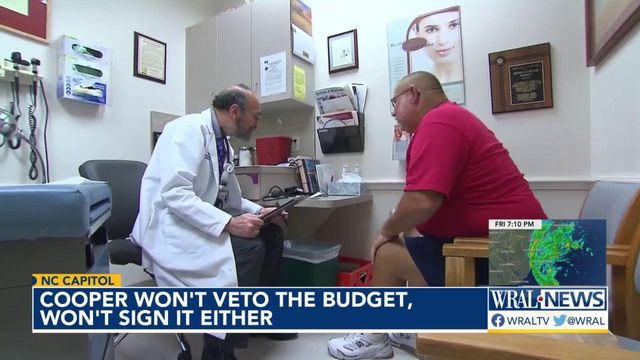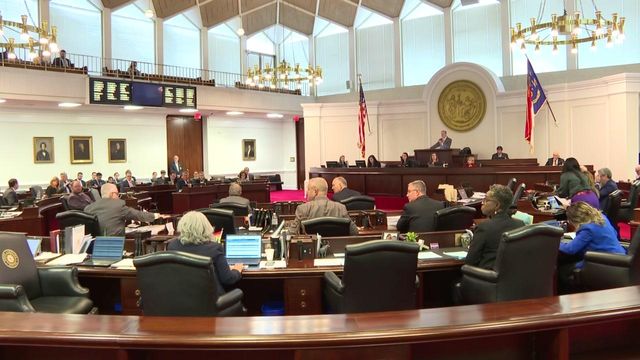'Most significant budget' in NC to become law after Senate vote, Cooper decision
North Carolina's $30-billion budget, stuffed with Republican priorities but also containing a long-sought Democratic victory on Medicaid expansion, will become law without Gov. Roy Cooper's signature, he announced shortly after the GOP-held Senate gave final legislative approval Friday morning.
The budget, delayed by Republican disputes over expanded gambling in the state, comes months after the July 1 start of the fiscal year.
The expansion of Medicaid, a top issue for Cooper since he was first elected governor in 2016, will give health insurance to hundreds of thousands of the state's working poor. Expansion passed previously in the session, but its implementation was tied to the budget.
"Health insurance for 600,000 more North Carolinians that brings more mental health and substance use disorder treatment, help for desperate rural hospitals and billions of dollars into our economy is a life-saving, monumental decision for our state," Cooper said in a statement moments after the Senate passed the measure in a 26-17 final vote Friday morning.
"Make no mistake, overall this is a bad budget that seriously shortchanges our schools, prioritizes power grabs, keeps shady backroom deals secret and blatantly violates the constitution, and many of its provisions will face legal action."
No Senate Democrat voted in favor of the measure. Several House Democrats joined Republicans in a 70-40 vote just after midnight that followed a day of intense debate over the measure.
"It'd be nice if he'd go ahead and sign it," Senate leader Phil Berger, R-Rockingham, said after the vote. "We can move everything along a little quicker. I think that's an indication that this budget is a solid budget. It's something that is good for the state of North Carolina. It does a lot of things. There are some things in the budget that I'm not so crazy about and I think just about everybody that voted for it could say the same thing.
"But, on balance, it is, in many respects, the most significant budget we have seen in North Carolina."
Budget debate
Agreement on the budget seemed almost impossible a week ago, when Republican leaders were in a stalemate over whether to include a provision to legalize more casinos. The push drew criticism from social conservatives and some Republicans. At one point, proposals surfaced to tie expanded gambling to the implementation of Medicaid expansion, drawing a strong rebuke from legislative Democrats whose votes would have been needed to get the measure approved.
The House and Senate passed separate budgets earlier in the session that included disagreements over how much to raise state worker and teacher pay, how quickly to reduce tax rates and how much of savings to spend.
Once the casino stalemate was resolved late Tuesday with Berger, a top proponent of the proposal, and House Speaker Tim Moore announcing the push was dead for now, the budget moved quickly with Republican super majorities in both chambers making passage a foregone conclusion.
The final budget document was made public Wednesday afternoon, about 18 hours before the vote, causing Democrats to sharply criticize the process and lack of public input. The budget was negotiated in secret for months by top GOP leaders and is being passed using a procedural move that doesn't allow anyone to suggest changes or amendments now that it has become public.
During long floor debate this week, Republicans leaders defended its substance, citing balancing tax cuts with moderate raises for state employees, additional health care funding, millions added to savings, and billions spent on construction and infrastructure projects.
"This budget is built on key investments in our state's infrastructure — meeting our needs on health care, education, transportation, manufacturing and tourism, just to name a few," House budget writer Rep. Donny Lambeth, R-Forsyth, said during the floor debate Thursday.
For the House’s final vote early Friday morning, Lambeth attempted to recruit Democrats to his side. “There’s a lot of people on my side that are going to hold their nose” to vote for the budget. “Look at the big picture, we need to get this done and move on.”
State Rep. Wesley Harris, D-Mecklenburg, offered a brief retort: “I respectfully disagree. It’s still a bad budget. I encourage you to vote no.”
That’s despite the budget containing Medicaid expansion, a key priority of Democrats for years. They said the budget contained too many other objectionable features such as further tax cuts, too-low raises for state workers and hundreds of millions in additional funding for private schools in the form of tuition vouchers.
Friday morning, five House Democrats voted with Republicans to move the budget forward: Cecil Brockman of Guilford County, Carla Cunningham of Mecklenburg County, Garland Pierce of Scotland County, Shelly Willingham of Edgecombe County, and Michael Wray of Northampton County.
Their votes came less than a day after Democratic lawmakers spent hours objecting to the budget Thursday, attacking decisions such as the GOP-backed choice to spend hundreds of millions of dollars more on private school tuition vouchers rather than paying higher raises to teachers or state workers.
Most state workers will receive a 4% raise this year and a 3% raise next year. Public school teachers would see a range of step increases on their salary ladder, from 3.6% over the next two years for teachers with over 15 years of experience, up to a nearly 11% increase for beginning teacher pay from $37,000 a year now to $41,000 by the 2024-25 school year.
Sen. Michael Lee, R-New Hanover, said Thursday that by the 2024-25 school year, the average teacher should be making more than $60,000.
"This budget continues the successes North Carolina has seen over the last decade," top Senate budget writer Sen. Brent Jackson, R-Sampson, said Thursday. He said he's proud that "we’ve been able to do so without saddling the taxpayers of this state with debt."
Advocates for teachers and state employees have criticized the budget for not doing more on raises, given the state's record spending levels. Rep. Renee Price, D-Orange, said Thursday that the budget disrespects current and retired state workers.
"We should be providing larger raises for our dedicated employees," she said. "We should be giving cost-of-living [pension increases] to the folks who spent years upon years of their lives serving us."
GOP priorities in budget
But Republican leaders defended their choices on the budget, which is full of policy victories for the party on other matters such as banning vaccine requirements, allowing more judges to carry guns into courts and opening school vouchers to any student, regardless of income level, in the state.
The budget would open up the Opportunity Scholarship Program to wealthy families for the first time in almost a decade of existence — something school choice advocates have sought for years but that critics, including Cooper, fear will drain funding from the state's public schools. The state currently spends $133 million on the voucher program, and the new changes are expected to increase its spending to $500 million annually by the end of the decade.
"We could double the raises to our teachers if we spent the money that we're spending on private school vouchers and instead put it toward our teachers," Rep. Brandon Lofton, D-Mecklenburg, said Thursday. "This budget not only fails to meet our needs today, it makes it harder for us to meet our needs going forward."
It also gives the legislature, which will redraw its districts in the coming months with a sympathetic state Supreme Court likely to approve the maps, expansive new powers to conduct investigations, shield their records from public disclosure, appoint judges and confirm other state leaders, such as the head of the community college system, the state's fire marshal and others.
The budget continues a push by fiscal conservatives to pay off billions of dollars in debt, with this and past budgets cutting the state's debt from $6.5 billion in 2016 to $3.5 billion this year, budget writer Rep. Dean Arp, R-Union said Thursday. He added that the state also now has more than $5 billion in savings, in case it's needed in the future to respond to natural disasters or fill budget holes caused by economic downturns.
Arp said that between the last two budgets, the state government will have also spent $2 billion on building new schools around the state — something that's actually the duty of local governments, but which the state has decided to help out on to aid struggling communities, particularly in rural areas.
There was intense partisan debate Thursday over the budget's priorities, both with spending and with the policy changes tucked into the budget.
Rep. Julie von Haefen, D-Wake, said the legislature is mostly made of older people who have more or less ignored the growing issues with affordability and availability of childcare. She noted that an earlier version of the budget did have $10 million extra funding for early childhood education, but that it was cut somewhere along the way, during the GOP's secret budget negotiations of the last few months.
"We had more than enough opportunity to address all the various aspects of our childcare crisis this year," von Haefen said. "This budget fails our kids."
But there were also some areas of bipartisan agreement, particularly on health care. The budget also contains significant spending on improving mental health care statewide.
"Are there challenges still? Well, absolutely," Lambeth said. "But working together we can meet those challenges. This budget responds to the stress on our citizens by investing in our state."














